-
REVIEW01-01-2017
Patient with stroke: hospital discharge planning, functionality and quality of life
Revista Brasileira de Enfermagem. 2017;70(2):415-423
Abstract
REVIEWPatient with stroke: hospital discharge planning, functionality and quality of life
Revista Brasileira de Enfermagem. 2017;70(2):415-423
DOI 10.1590/0034-7167-2016-0166
Views0See moreABSTRACT
Objective:
analyze the strategies of hospital discharge planning for these patients, increasing the knowledge related to hospitalhome transition, discharge planning processes and the main impact on the quality of life and functionality.
Method:
integrative literature review using the PICOD criteria, with database research.
Results:
19 articles were obtained, using several approaches and contexts. For quality of life, the factors related to the patient satisfaction with care and the psychoemotional aspects linked with functionality are the most significant.
Conclusion:
during the hospitalization period, a careful hospital discharge planning and comprehensive care to patients and caregivers – in particular the functional and psychoemotional aspects – tend to have an impact on the quality of life of patients.

-
RESEARCH01-01-2017
Nursing throughout war times: political propaganda and professional valorization (1942-1945)
Revista Brasileira de Enfermagem. 2017;70(2):407-414
Abstract
RESEARCHNursing throughout war times: political propaganda and professional valorization (1942-1945)
Revista Brasileira de Enfermagem. 2017;70(2):407-414
DOI 10.1590/0034-7167-2016-0440
Views0See moreABSTRACT
Objective:
to discuss the symbolic effects of the publication on written press of institutional rites related to the courses promoted by the Brazilian Federal District’s Schools of Nursing during the Second World War.
Method:
exploratory and documentary study, whose sources were treated by historical method.
Results:
one noticed, in the news reports analyzed, that the Brazilian Estado Novo has used nurses images to divulge within the society the woman’s acting altruistic model in service to the country, through the systematic diffusion by the press of her honorable acting during the war, what assured the amplification of the visibility and acknowledgment of the Nursing profession in that context.
Conclusion:
the diffusion by press of emergency nurses graduations magnified their apparition in public spaces, occasion on which the institutional rite was strategically used to transmit to the society the urgency of the new profession, in order to support the political causes in vigor in the country.
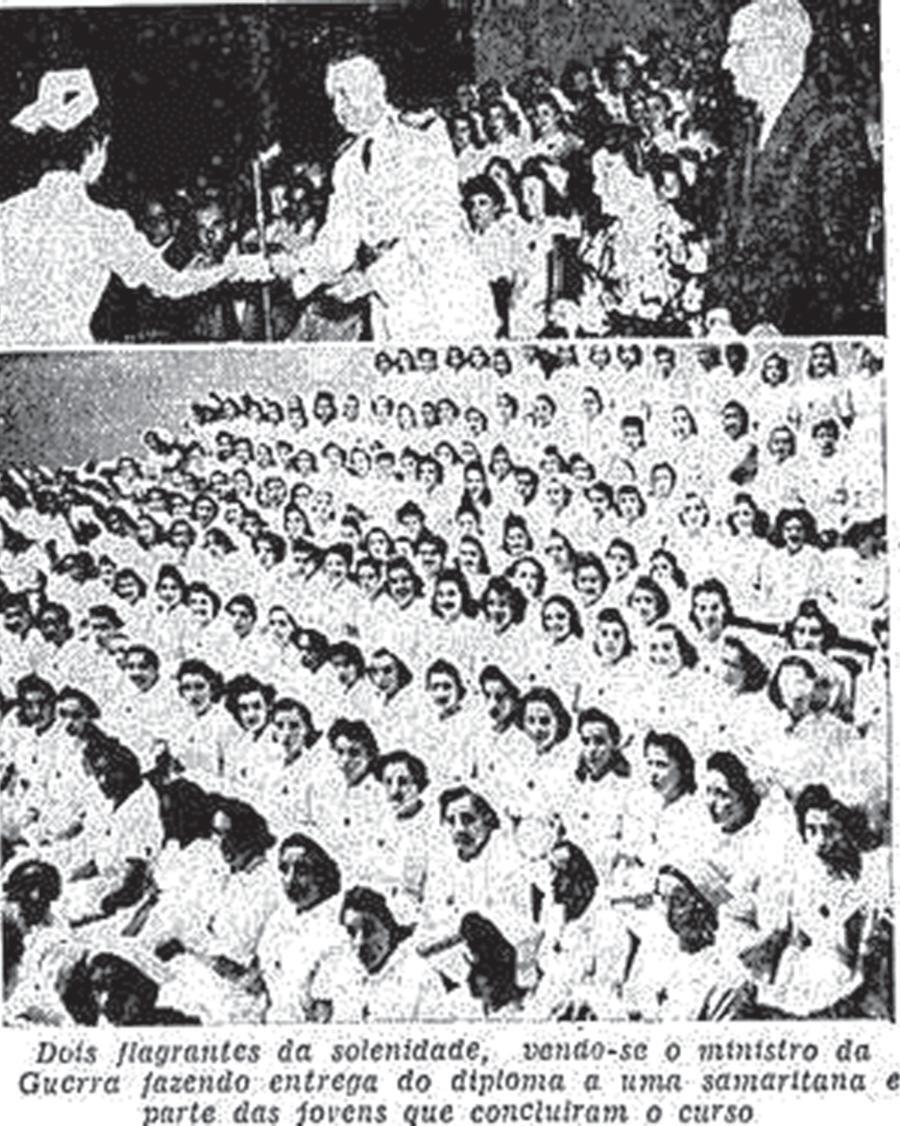
-
RESEARCH01-01-2017
Conformity of nurse prescribing to care needs: nurses’ understanding
Revista Brasileira de Enfermagem. 2017;70(2):400-406
Abstract
RESEARCHConformity of nurse prescribing to care needs: nurses’ understanding
Revista Brasileira de Enfermagem. 2017;70(2):400-406
DOI 10.1590/0034-7167-2016-0107
Views0See moreABSTRACT
Objective:
investigate the understanding of nurses on nurse prescribing conformity to the care needs of hospitalized patients and factors associated with that conformity.
Method:
a descriptive study, with a quantitative approach, was conducted at 20 in-patient units of a teaching hospital in the state of São Paulo. The participants (N=139) answered a semi-structured questionnaire.
Results:
For 43 (30.9%) nurses, nurse prescribing is always in line with patients’ care needs. The fields of body care and elimination, skin and mucosa care and investigation and monitoring were the most frequently addressed.
Conclusion:
in the perception of most nurses, nurse prescribing does not conform with patients’ health heeds. The establishment of strategies to improve prescribing quality is recommended, as well as the development of permanent qualification programs and the systematic use of instruments for assessment of patients’ care demands regarding nursing.
-
RESEARCH01-01-2017
Religious and spiritual coping in people living with HIV/Aids
Revista Brasileira de Enfermagem. 2017;70(2):392-399
Abstract
RESEARCHReligious and spiritual coping in people living with HIV/Aids
Revista Brasileira de Enfermagem. 2017;70(2):392-399
DOI 10.1590/0034-7167-2015-0170
Views0See moreABSTRACT
Objective:
evaluate the religiosity and the religious/spiritual coping of people living with HIV/Aids.
Method:
descriptive, cross-sectional study with quantitative approach, conducted in a reference HIV/Aids outpatient clinic in a university hospital of Recife-PE, Brazil, from June to November 2015. At total of 52 people living with HIV/Aids (PLWHA) participated in the research, which employed own questionnaire, the Duke University Religion Index (DUREL), and the Religious/Spiritual Coping Scale (RCOPE).
Results:
the sample presented high indices of organizational religiosity (4.23±1.66), non-organizational religiosity (4.63±1.50), and intrinsic religiosity (13.13±2.84). Positive RCOPE was used in high mean scores (3.66±0.88), and negative RCOPE had low use (2.12 ± 0.74). In total, use of RCOPE was high (3.77±0.74), having predominated the positive RCOPE (NegRCOPE/PosRCOPE ratio=0.65±0.46).
Conclusion:
it is evident the importance of encouraging religious activity and RCOPE strategies, seen in the past as inappropriate interventions in clinical practice.
-
RESEARCH01-01-2017
Satisfaction and dissatisfaction in the work of recyclable solid waste segregators: convergent-care research
Revista Brasileira de Enfermagem. 2017;70(2):384-391
Abstract
RESEARCHSatisfaction and dissatisfaction in the work of recyclable solid waste segregators: convergent-care research
Revista Brasileira de Enfermagem. 2017;70(2):384-391
DOI 10.1590/0034-7167-2016-0325
Views0See moreABSTRACT
Objectives:
describe elements that promote satisfaction and dissatisfaction in the work of recyclable solid waste segregators and conduct a nursing action focused on these elements.
Method:
qualitative research, convergent-care, conducted with members of the cooperative. Data production occurred during 2015 through participation observation, semi-structured interviews, and a convergence group. Analysis comprised the phases Apprehension, Synthesis, Theorization, and Transference.
Results:
four categories emerged. They showed satisfaction and dissatisfaction related to identification with tasks and work content, material and personal gains obtained from solid waste segregation, prejudice, lack of appreciation, and difficulties in interpersonal relationships. This last item, due to its importance, received a nursing action.
Conclusion:
the study contributed to the advancement of knowledge and the association of possibilities between the research performance and nursing care for workers.
-
RESEARCH01-01-2017
The game as strategy for approach to sexuality with adolescents: theoretical-methodological reflections
Revista Brasileira de Enfermagem. 2017;70(2):376-383
Abstract
RESEARCHThe game as strategy for approach to sexuality with adolescents: theoretical-methodological reflections
Revista Brasileira de Enfermagem. 2017;70(2):376-383
DOI 10.1590/0034-7167-2016-0043
Views0See moreABSTRACT
Objective:
To describe the Papo Reto [Straight Talk] game and reflect on its theoretical-methodological basis.
Method:
Analytical study on the process of elaboration of the Papo Reto online game, destined to adolescents aged 15-18 years, with access to the Game between 2014 and 2015.
Results:
the interactions of 60 adolescents from Belo Horizonte and São Paulo constituted examples of the potentialities of the Game to favor the approach to sexuality with adolescents through simulation of reality, invention and interaction. Based on those potentialities, four thinking categories were discussed: the game as pedagogic device; the game as simulation of realities; the game as device for inventive learning; and the game empowering the interaction.
Conclusion:
By permitting that the adolescents take risks on new ways, the Game allows them to become creative and active in the production of senses, in the creation of their discourses and in the ways of thinking, feeling and acting in the sexuality field.
-
RESEARCH01-01-2017
Tuberculosis among prison staff in Rio Grande do Sul
Revista Brasileira de Enfermagem. 2017;70(2):370-375
Abstract
RESEARCHTuberculosis among prison staff in Rio Grande do Sul
Revista Brasileira de Enfermagem. 2017;70(2):370-375
DOI 10.1590/0034-7167-2016-0012
Views0See moreABSTRACT
Objective:
to evaluate the risk of infection and illness caused by Mycobacterium tuberculosis among health care and security staff in prisons in two regions of Rio Grande do Sul (RS).
Method:
cross-sectional study involving prison staff. An interview and sputum smear microscopy and culture were performed. Latent infection was evaluated according to the result of the tuberculin test (TT), self-referred.
Results:
among staff who had a TT, 10 (83.3%) in the central region and 2 (16.7%) in the southern region were considered reactors. Length of employment among prison officers who reacted to TT was 15.3 years, and among health care workers, 4.1 years (p = 0.01). No cases of active tuberculosis (TB) were identified.
Conclusion:
prevalence of latent TB was 27.9%. Length of employment between different professional categories and their working regions was considered a risk factor for latent TB.
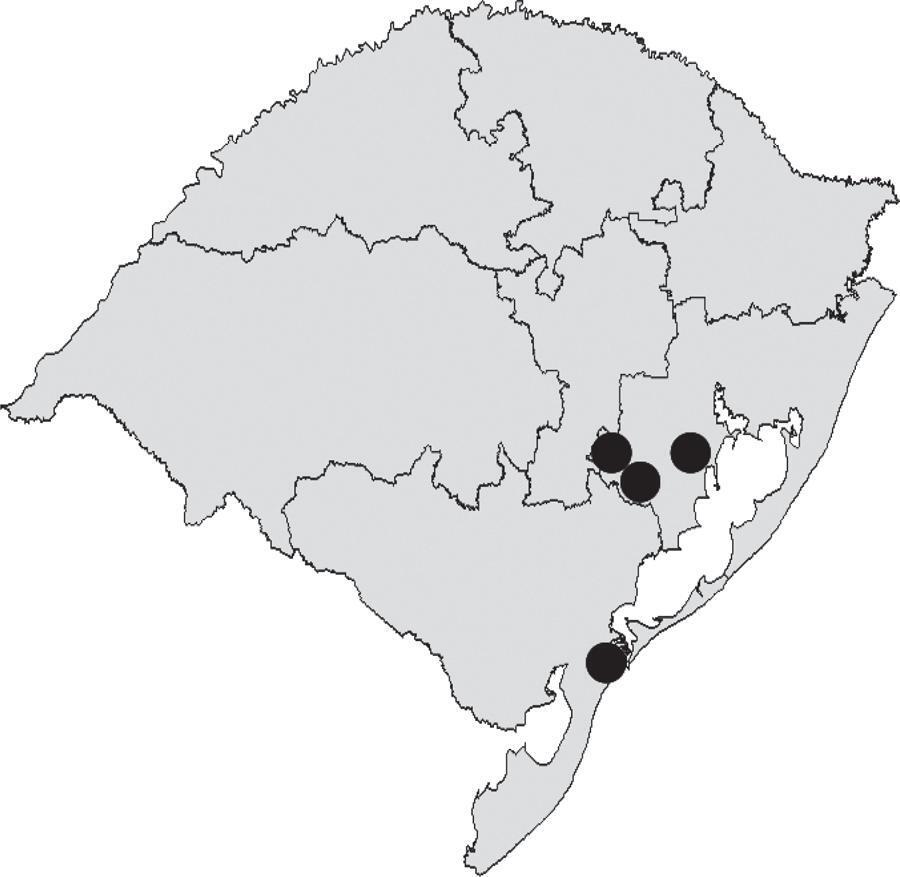
-
RESEARCH01-01-2017
Portable bathtub: technology for bed bath in bedridden patients
Revista Brasileira de Enfermagem. 2017;70(2):364-369
Abstract
RESEARCHPortable bathtub: technology for bed bath in bedridden patients
Revista Brasileira de Enfermagem. 2017;70(2):364-369
DOI 10.1590/0034-7167-2016-0178
Views0See moreABSTRACT
Objective:
determine the benefits of the Portable Bathtub as technology for bed bath in bedridden patients.
Method:
qualitative research of exploratory-descriptive character, whose data were collected by means of 30 interviews with patients, family members and professionals directly involved in bed bath, carried out with Portable Bathtub, in bedridden patients of a medical clinic, from July to December 2015.
Results:
from the data encoded by thematic content analysis resulted two categories: Portable Bathtub: from morphine to the patient’s rekindled eyes; From mechanized practice to unique, transforming care.
Conclusion:
we concluded that the Portable Bathtub constitutes enhancing technology, as it enables clinical improvement of the patient’s general condition and transcends traditional mechanized practices by the reach of advanced nursing care practices.
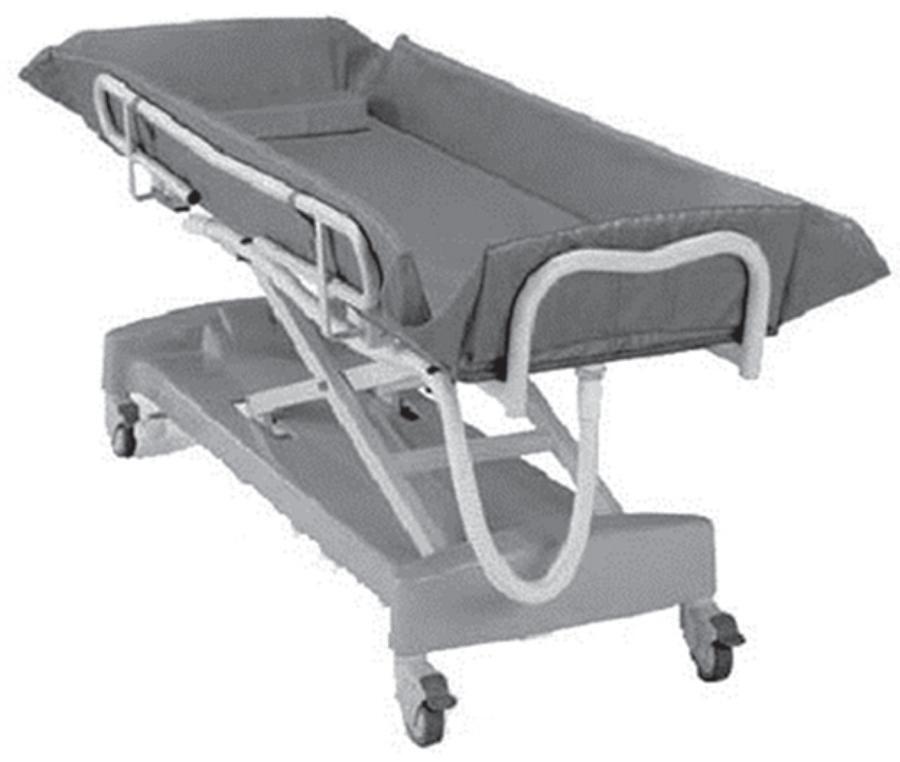
-
ORIGINAL ARTICLE12-04-2023
Burnout, ethical climate and work organization in covid-19 intensive care units: mixed method study
Revista Brasileira de Enfermagem. 2023;76:e20220684
Abstract
ORIGINAL ARTICLEBurnout, ethical climate and work organization in covid-19 intensive care units: mixed method study
Revista Brasileira de Enfermagem. 2023;76:e20220684
DOI 10.1590/0034-7167-2022-0684
Views0See moreABSTRACT
Objectives:
to analyze the association between burnout and the perception of the ethical climate in nursing professionals in the covid-19 Intensive Care Unit and the relationship with the organization of work from the perspective of managers of these units.
Methods:
mixed method study conducted in three university hospitals in southern Brazil from December 2021 to March 2022. A cross-sectional study was developed with 110 nursing professionals, followed by an exploratory-descriptive study through semi-structured interviews with six managers. Descriptive and analytical statistics and discursive textual analysis were used.
Results:
the prevalence of burnout was 10% and the perception of negative ethical climate was 24.5%. The association between burnout and ethical climate revealed overload and fatigue during working hours, related to tension, fear, and stress that emerged from the consequences of the organization and relations of work in the covid-19 Intensive Care Unit.
Conclusions:
there was an association between burnout and ethical climate and elements of the work organization.
-
ERRATUM02-26-2024
ERRATUM
Revista Brasileira de Enfermagem. 2024;77(1):e20160061
Abstract
ERRATUMERRATUM
Revista Brasileira de Enfermagem. 2024;77(1):e20160061
DOI 10.1590/0034-7167.20247701e03
Views2In the article “Nurses in the labor market: professional insertion, competencies and skills”, with DOI number: , published in Revista Brasileira de Enfermagem, 2017;70(6):1220-6, on page 1225:Include before REFERENCES:[…]See more -
ERRATUM06-14-2024
ERRATUM
Revista Brasileira de Enfermagem. 2024;77(2):e2024n2e06
Abstract
ERRATUMERRATUM
Revista Brasileira de Enfermagem. 2024;77(2):e2024n2e06
DOI 10.1590/0034-7167.20247702e06
Views2In the article “Is there scientific relevance to the plot of films and documentaries about eating disorders?”, with DOI number: , published in Revista Brasileira de Enfermagem, 2024;77(1):e20220547, page 7:Where it read:[…]See more -
ORIGINAL ARTICLE07-29-2024
Educational technology for multidisciplinary training for managing waiting lists for elective patients
Revista Brasileira de Enfermagem. 2024;77(3):e20230299
Abstract
ORIGINAL ARTICLEEducational technology for multidisciplinary training for managing waiting lists for elective patients
Revista Brasileira de Enfermagem. 2024;77(3):e20230299
DOI 10.1590/0034-7167-2023-0299
Views1See moreABSTRACT
Objectives:
to construct and assess an educational technology for managing patient waiting lists for multidisciplinary training.
Methods:
study supported by Instructional Design – ADDIE model, whose stages of construction of educational technology were developed in the form of a multi-professional training course. Its respective content assessment was carried out by a committee of experts from 2021 to 2022. The analysis occurred based on the proportion of content adequacy with 95% Confidence Interval.
Results:
seventeen products were created as educational technology learning objects: five storyboards; four videos; three comic books; two pedagogical action plans; a mind map; and a YouTube® playlist. Nine experts assessed content adequacy, which reached 0.89.
Conclusions:
this educational technology contributes to the performance of professionals who manage waiting lists by reducing inequalities, alleviating differences, in addition to promoting equity in care and good health for patients in the Brazilian Health System.

-
REVIEW11-22-2024
Spirituality and religiosity in children, adolescents and their families in a vulnerable context: a scoping review
Revista Brasileira de Enfermagem. 2024;77(5):e20230425
Abstract
REVIEWSpirituality and religiosity in children, adolescents and their families in a vulnerable context: a scoping review
Revista Brasileira de Enfermagem. 2024;77(5):e20230425
DOI 10.1590/0034-7167-2023-0425
Views1See moreABSTRACT
Objective:
to map evidence in the literature on the spirituality and religiosity of children, adolescents and their families in social vulnerability.
Methods:
this is a scoping review based on the JBI methodology, with the search without delimiting the time period, in English, Portuguese and Spanish, in the Virtual Health Library, PubMed, Embase, Cochrane Library, Scopus and Web of Science databases.
Results:
twenty-two studies were identified. The most studied population were adolescents, followed by children and their families. Regarding the setting, the context of vulnerability related to the low socioeconomic level experienced by these populations was highlighted. Furthermore, spirituality and religiosity were considered important for coping, social support, purpose and strength.
Conclusion:
there is an influence of spirituality and religiosity in the lives of children, adolescents and families, being a protective factor and a source of comfort, playing essential tools for living in context.

-
ORIGINAL ARTICLE12-13-2024
Stress in nursing workers caring for people with COVID-19
Revista Brasileira de Enfermagem. 2024;77(5):e20230542
Abstract
ORIGINAL ARTICLEStress in nursing workers caring for people with COVID-19
Revista Brasileira de Enfermagem. 2024;77(5):e20230542
DOI 10.1590/0034-7167-2023-0542
Views1See moreABSTRACT
Objectives:
to analyze stress from the perspective of nursing workers caring for people with COVID-19 in a public hospital in the Recôncavo region of Bahia.
Methods:
this is an exploratory qualitative study, conducted through semi-structured interviews. The data were analyzed using word clouds, similarity trees, and content analysis.
Results:
nursing workers were exposed to stress while attending to patients with COVID-19. The reported stressors in the workplace included: work overload, lack of planning, speed in performing tasks, fatigue, lack of participation in decision-making, lack of support from management, technological changes, excessive responsibility without preparation, interpersonal conflicts, and professional undervaluation.
Conclusions:
exposure to these stressors leads to emotional exhaustion and demotivation, which were intensified during the COVID-19 pandemic.

-
ORIGINAL ARTICLE01-13-2024
Knowledge, Attitudes, and Practices of nurses regarding blood culture collection
Revista Brasileira de Enfermagem. 2024;77(6):e20230424
Abstract
ORIGINAL ARTICLEKnowledge, Attitudes, and Practices of nurses regarding blood culture collection
Revista Brasileira de Enfermagem. 2024;77(6):e20230424
DOI 10.1590/0034-7167-2023-0424
Views2See moreABSTRACT
Objectives:
to investigate the knowledge, attitudes, and practices of nurses regarding blood culture collection.
Methods:
a cross-sectional study was conducted in five Brazilian public hospitals with 112 nurses. Data were collected using an adapted questionnaire and analyzed through descriptive and inferential statistics.
Results:
nurses who did not consider themselves capable of collecting blood cultures had a 72% lower chance of performing the collection at the recommended site and an 83% lower chance of using the same needle for blood inoculation into the vials. Nurses working in the emergency department had a 75% lower chance of knowing the international benchmark for blood culture contamination rates, and those with less than 5 years in the position decreased their chance of accuracy in this matter by 79%.
Conclusions:
there are gaps in the knowledge, attitudes, and practices of nurses regarding blood culture collection. Standardization of the technique, periodic education, supervision and guidance of the collection team, and process auditing are recommended coping strategies.

-
ORIGINAL ARTICLE01-10-2024
Inventory of ethical problems in mobile pre-hospital care
Revista Brasileira de Enfermagem. 2024;77:e20230539
Abstract
ORIGINAL ARTICLEInventory of ethical problems in mobile pre-hospital care
Revista Brasileira de Enfermagem. 2024;77:e20230539
DOI 10.1590/0034-7167-2023-0539
Views1See moreABSTRACT
Objective:
to construct and validate the content of an inventory of ethical problems experienced by nurses in mobile pre-hospital care.
Method:
a psychometric approach study, developed with the following stages: (1) instrument construction through a theoretical matrix based on deliberative bioethics, scoping review and online qualitative research; (2) content validity by judges; (3) pre-testing with Mobile Emergency Care Service nurses in various Brazilian states. For content validity analysis, the Content Validity Ratio was calculated (CVR>0.45 for judges and CVR>0.35 for the target population).
Results:
the instrument had 44 items, distributed across four dimensions.
Final considerations:
the constructed instrument presented sources of evidence of content validity, providing good psychometric measurements and constituting a useful tool for nurses’ practice in the pre-hospital setting.

-
REVIEW07-06-2020
Patient safety challenges in primary health care: a scoping review
Revista Brasileira de Enfermagem. 2020;73(5):e20190209
Abstract
REVIEWPatient safety challenges in primary health care: a scoping review
Revista Brasileira de Enfermagem. 2020;73(5):e20190209
DOI 10.1590/0034-7167-2019-0209
Views1See moreABSTRACT
Objectives:
to identify the patient safety challenges described by health professionals in Primary Health Care.
Methods:
a scoping review was conducted on the LILACS, MEDLINE, IBECS, BDENF, and CINAHL databases, and on the Cochrane, SciELO, Pubmed, and Web of Science libraries in January 2019. Original articles on patient safety in the context of Primary Health Care by health professionals were included.
Results:
the review included 26 studies published between 2002 and 2019. Four categories resulted from the analysis: challenges of health professionals, administration challenges of health services, challenges with the patient and family, and the potential enhancing resources for patient safety.
Conclusions:
patient safety challenges for Primary Care professionals are multiple and complex. This study provides insight into resources to improve patient safety for health care professionals, patients, administrators, policy makers, educators, and researchers.
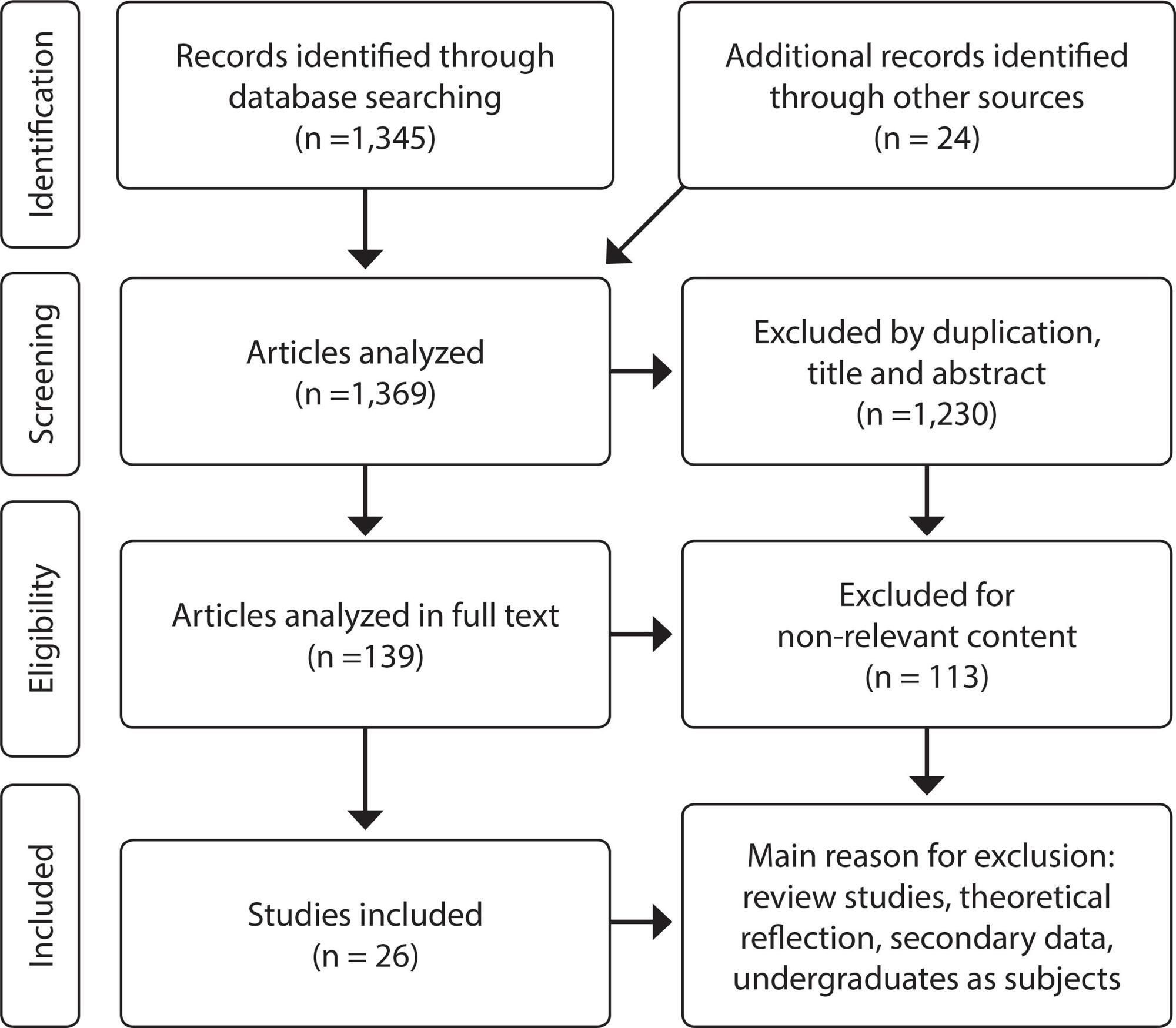
-
07-16-2021
Sleep quality and its association with menopausal and climacteric symptoms
Revista Brasileira de Enfermagem. 2021;74:e20201150
Abstract
Sleep quality and its association with menopausal and climacteric symptoms
Revista Brasileira de Enfermagem. 2021;74:e20201150
DOI 10.1590/0034-7167-2020-1150
Views0See moreABSTRACT
Objective:
to assess sleep quality in menopausal women and its association with symptoms related to this period.
Method:
this is a cross-sectional, analytical and correlational study. Sleep was assessed using the Pittsburgh Sleep Quality Index; and climacteric symptoms, according to the Menopause Rating Scale. To compare the total score and each Menopause Rating Scale domain with the PSQI classification, the Mann-Whitney U non-parametric test was used. P<0.05 was considered significant.
Results:
261 women (67.8%) were classified as bad sleepers. There was a positive and significant correlation between the sleep scale scores and the total menopause score and its domains. Women categorized as poor sleepers had worse scores on the menopause symptom scale.
Conclusion:
women with worse sleep quality revealed greater severity of symptoms related to menopause.
-
ORIGINAL ARTICLE08-10-2020
Eliot Freidson’s sociology of professions: an interpretation for Health and Nursing
Revista Brasileira de Enfermagem. 2020;73(6):e20180950
Abstract
ORIGINAL ARTICLEEliot Freidson’s sociology of professions: an interpretation for Health and Nursing
Revista Brasileira de Enfermagem. 2020;73(6):e20180950
DOI 10.1590/0034-7167-2018-0950
Views0See moreABSTRACT
Objectives:
to analyze theoretical conceptions of Eliot Freidson’s Sociology of Professions scoped on health and nursing professions.
Methods:
Eight nurses were interviewed, all involved in the development of the professional Council on the timeframe from 1975 to 1986. Documental resources were Laws, Ordinances, Resolutions, Reports, Meeting Minutes and Public Deeds. Information was organized as from literature and Eliot Freidson’s conceptions, and thematic content analysis was carried out.
Results:
the concepts authored by Eliot Freidson allowed for the development of a concept chart that portrays the nursing profession and that may be expanded for the other occupations in the health field, in consonance with professional organization in the country.
Final Considerations:
Eliot Freidson’s framework, in interpretation for nursing, consolidates the profession with relative autonomy, expertise by Nursing Care Systematization and credentialism by professional normalizations.
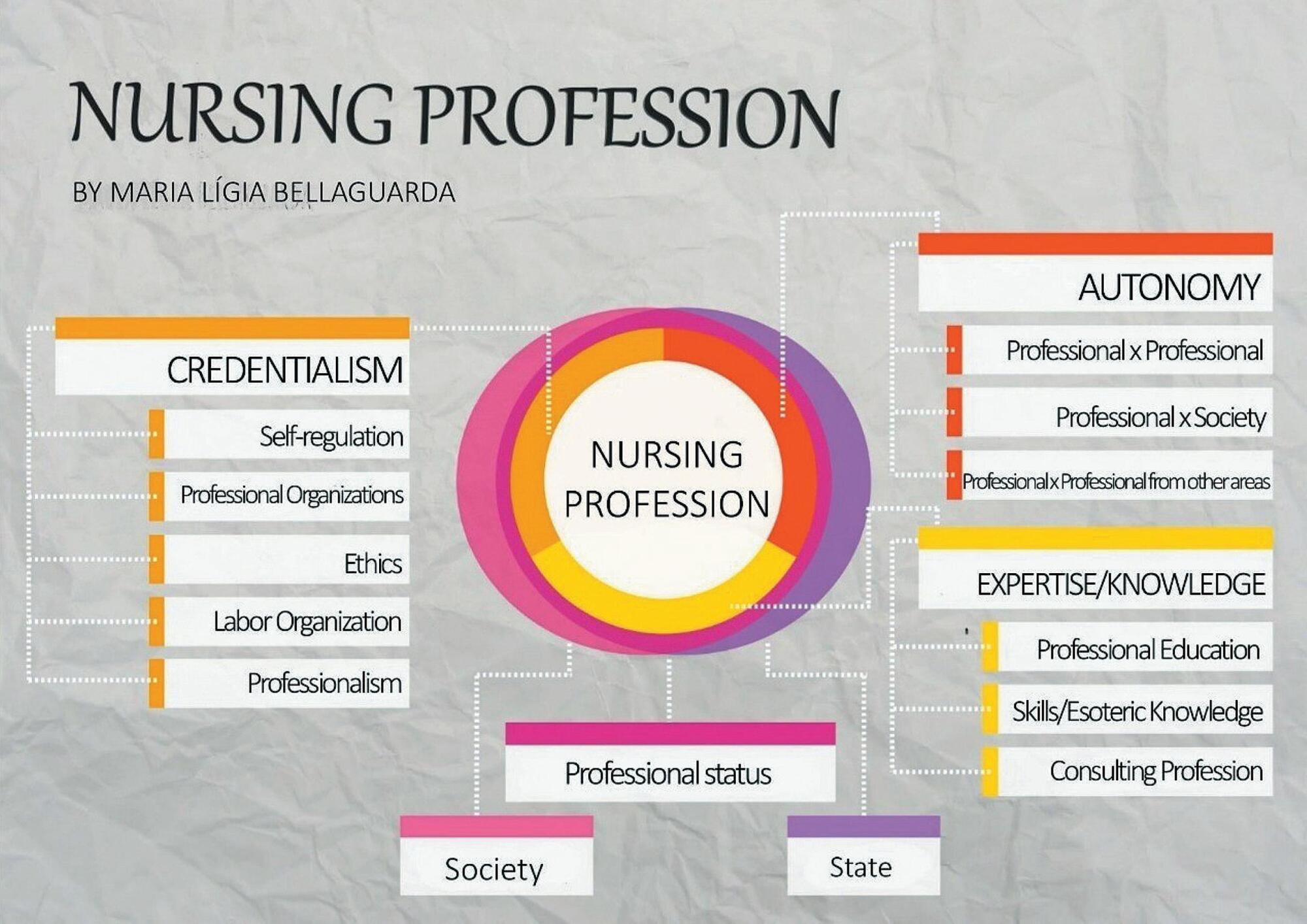
-
REVIEW01-20-2021
Psychosocial factors in nursing work and occupational risks: a systematic review
Revista Brasileira de Enfermagem. 2021;74:e20200198
Abstract
REVIEWPsychosocial factors in nursing work and occupational risks: a systematic review
Revista Brasileira de Enfermagem. 2021;74:e20200198
DOI 10.1590/0034-7167-2020-0198
Views0See moreABSTRACT
Objective:
to identify, in international scientific production, the main psychosocial factors in nursing work, found through the Copenhagen Psychosocial Questionnaire (COPSOQ) application.
Methods:
a systematic review study of psychosocial factors at work among nursing professionals, who used COPSOQ in the assessment of work environments.
Results:
fifteen articles were identified, which highlighted as main psychosocial dimensions of nursing work demands, work organization, social relationships and leadership, work-home interface, workplace health and well-being and offensive behaviors.
Conclusion:
the high demands for cognitive, emotional work and work pace were identified in the nursing routine. Management support had a positive impact. Physical and psychological violence and shift work interfere in family life, aggravating the fatigue of these professionals. Interventions for reducing work stress presuppose the identification of psychosocial factors involved in nursing work.
-
ORIGINAL ARTICLE12-05-2019
Factors associated with frailty syndrome in the rural elderly
Revista Brasileira de Enfermagem. 2019;72:14-21
Abstract
ORIGINAL ARTICLEFactors associated with frailty syndrome in the rural elderly
Revista Brasileira de Enfermagem. 2019;72:14-21
DOI 10.1590/0034-7167-2017-0079
Views0See moreABSTRACT
Objective:
determine the prevalence and factors associated with frailty syndrome (FS) in the elderly in the rural population of Pelotas.
Method:
Quantitative, analytical, transversal study conducted with 820 elderly subjects registered in the Family Health Strategy (FHS) in the rural area in the municipality of Pelotas, from July to October 2014.
Results:
among those evaluated, 43.41% showed FS. These factors were consolidated as associated with the condition: low income (PR: 1.54, p ≤ 0.001), low educ. level (PR: 1.45, p ≤ 0.001), nutritional status (obesity) (PR:1.89, p ≤ 0.001), physical inactivity (PR:1.93, p = 0.003), cognitive deficit (PR:2.07, p = 0.005), and poor self-perceived health (PR: 8.21, p ≤ 0.001).
Conclusion:
the findings may contribute effectively to the establishment of prevention and screening measures for frailty among the elderly by health professionals, especially nurses, aiming to prevent the occurrence of the syndrome and adverse and undesirable outcomes.

-
ORIGINAL ARTICLE07-06-2020
Association between knowledge and adherence to foot self-care practices performed by diabetics
Revista Brasileira de Enfermagem. 2020;73(5):e20190430
Abstract
ORIGINAL ARTICLEAssociation between knowledge and adherence to foot self-care practices performed by diabetics
Revista Brasileira de Enfermagem. 2020;73(5):e20190430
DOI 10.1590/0034-7167-2019-0430
Views0See moreABSTRACT
Objectives:
to verify the association between knowledge and adherence to foot self-care practices performed by patients with diabetes mellitus type 2.
Methods:
cross-sectional, descriptive study carried out with 197 patients in basic health units located in the Northeast region of Brazil. For data collection, we used a semi-structured questionnaire that addressed issues inherent to knowledge and Diabetes Self-Care Activities.
Results:
we observed that patients with moderate knowledge about self-care practices were more likely to perform foot self-examination, dry the interdigital spaces, moisturize their feet with creams and oils, observe the presence of mycosis and ingrown toenail when compared to patients with insufficient knowledge.
Conclusions:
the patients’ level of knowledge was closely related to the self-care activities carried out, which reinforces the importance of nurses working on training those on essential health care.
-
ORIGINAL ARTICLE06-01-2020
Factors associated with occupational stress among nursing professionals in health services of medium complexity
Revista Brasileira de Enfermagem. 2020;73:e20180913
Abstract
ORIGINAL ARTICLEFactors associated with occupational stress among nursing professionals in health services of medium complexity
Revista Brasileira de Enfermagem. 2020;73:e20180913
DOI 10.1590/0034-7167-2018-0913
Views0See moreABSTRACT
Objective:
To analyze the factors associated with occupational stress among nursing workers in health services of medium complexity.
Methods:
Epidemiological, cross-sectional, exploratory study. A randomly selected sample of 126 nursing professionals from medium complexity services in three cities in the state of Bahia (Santo Antônio de Jesus, Feira de Santana and Itabuna) was investigated. Data were collected in 2011 and 2012. The demand-control model proposed by Karasek was used to assess occupational stress. Simultaneous analysis of occupational stressors was performed using Poisson regression with robust variance.
Results:
The prevalence of occupational stress among nursing professionals was 77%. Occupational stress was associated with the professional category of nursing technician (p=0.01).
Conclusion:
The data indicates a concerning situation of exposure to occupational stressors, which requires coping strategies in order to protect the health of the worker.
-
ORIGINAL ARTICLE03-07-2022
Critically ill COVID-19 patients: a sociodemographic and clinical profile and associations between variables and workload
Revista Brasileira de Enfermagem. 2022;75:e20210119
Abstract
ORIGINAL ARTICLECritically ill COVID-19 patients: a sociodemographic and clinical profile and associations between variables and workload
Revista Brasileira de Enfermagem. 2022;75:e20210119
DOI 10.1590/0034-7167-2021-0119
Views0See moreABSTRACT
Objective:
To identify the sociodemographic and clinical profile of COVID-19 patients; measure workload and make associations between clinical variables.
Methods:
Cross-sectional study with 150 adult COVID-19 patients in an intensive care unit (from March to June 2020). Data from the electronic medical record in the first 24 hours of hospitalization: gender, age, education, origin, comorbidities, invasive mechanical ventilation, prone maneuver, renal replacement therapy, pressure injury, Braden, Nursing Activities Score, diagnoses, and nursing care. Descriptive statistical analysis, associations between clinical variables and age group.
Results:
Male (55.3%); mean age, 59 years; hypertensive (57.3%); obese (50.6%); diabetic (34%); invasive mechanical ventilation (66.7%); pronated (20.6%); hemodialysis (15.3%); Nursing Activities Score average, 86%. Twenty-eight nursing diagnoses and 73 cares were found.
Conclusion:
Patients required highly complex support. There was a significant association between pressure injury and workload with the prone maneuver. Nursing diagnoses and care reflect the needs of critical patients.
Search
Search in:
Nuvem de Tags
Adolescente (85) Atenção Primária à Saúde (239) COVID-19 (91) Criança (91) Cuidados de Enfermagem (269) Educação em Enfermagem (151) Educação em Saúde (139) Enfermagem (930) Enfermagem Pediátrica (86) Estudantes de Enfermagem (77) Estudos de Validação (131) Família (87) Idoso (208) Promoção da Saúde (99) Qualidade de Vida (104) Saúde do Trabalhador (86) Saúde Mental (145) Saúde Pública (82) Segurança do Paciente (150) Tecnologia Educacional (100)



